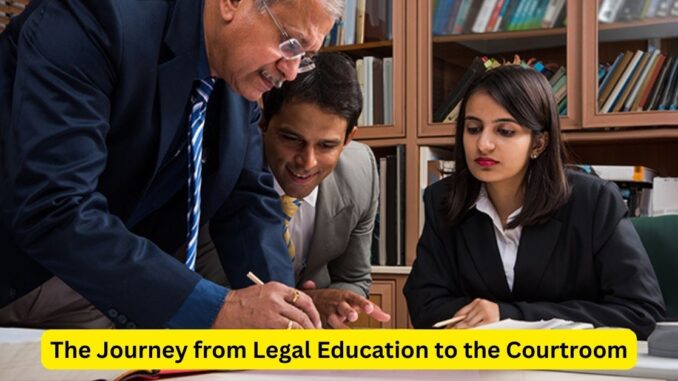
Legal education serves as the cornerstone for aspiring lawyers, laying the foundation for a career immersed in law and justice. Transitioning from the classroom to the courtroom involves a multifaceted journey that goes beyond theoretical knowledge, integrating practical skills, and experiential learning. Here’s an exploration of this transformative journey:
- Foundational Learning: Legal education typically begins with an immersion into foundational principles, statutes, and case law. Students delve into subjects like constitutional law, contracts, torts, and criminal law, acquiring a comprehensive understanding of legal theories and concepts.
- Critical Analysis and Legal Reasoning: Education in law emphasizes critical thinking and legal reasoning. Analyzing case precedents, identifying legal issues, and crafting persuasive arguments become integral skills honed during legal studies.
- Moot Courts and Mock Trials: Practical training through moot court competitions and mock trials bridges the gap between theory and practice. Students simulate courtroom scenarios, presenting arguments, examining witnesses, and experiencing the dynamics of legal proceedings.
- Internships and Clerkships: Hands-on experience gained through internships or clerkships at law firms, government agencies, or legal clinics is invaluable. Working under the guidance of practicing attorneys exposes students to real-world legal challenges, client interactions, and case management.
- Clinical Programs: Clinical programs provide students with direct client representation experience under supervision. These programs offer a practical understanding of client advocacy, legal research, and case strategy formulation.
- Legal Writing and Advocacy: Proficiency in legal writing is crucial. Crafting concise and persuasive legal documents, such as briefs, memos, and motions, is a skill honed throughout legal education and vital in courtroom practice.
- Ethical and Professional Development: Legal education emphasizes ethics and professionalism. Understanding the ethical responsibilities of a lawyer, maintaining integrity, and upholding professional conduct are ingrained values.
Transitioning from legal education to the courtroom involves applying learned principles to real-life legal scenarios. It requires a blend of knowledge, practical skills, adaptability, and a commitment to lifelong learning:
- Bar Exam and Licensing: After completing legal education, aspiring lawyers must pass the bar exam in their jurisdiction. This comprehensive examination tests legal knowledge and competency, serving as a gateway to practice law.
- Early Career Practice: Newly licensed attorneys often begin their careers by handling research, drafting documents, and assisting senior lawyers. Gaining courtroom experience gradually through motions, hearings, and trials forms a crucial part of their professional growth.
- Continuing Legal Education (CLE): Continuous learning is integral to legal practice. Engaging in CLE programs ensures attorneys stay updated with evolving laws, precedents, and ethical standards.
The journey from legal education to the courtroom encompasses a continuous evolution. It requires not only academic excellence but also practical skills, ethical fortitude, and a commitment to justice. Integrating theoretical knowledge with experiential learning equips aspiring lawyers to navigate the complexities of the legal profession with confidence and competence.
Leave a Reply